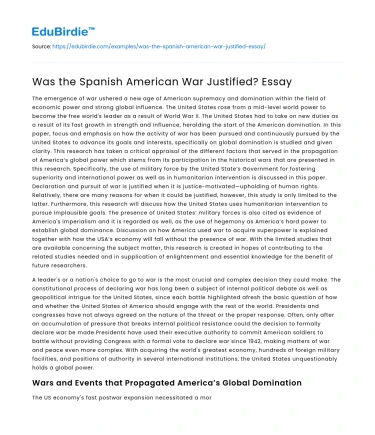The emergence of war ushered a new age of American supremacy and domination within the field of economic power and strong global influence. The United States rose from a mid-level world power to become the free world's leader as a result of World War II. The United States had to take on new duties as a result of its fast growth in strength and influence, heralding the start of the American domination. In this paper, focus and emphasis on how the activity of war has been pursued and continuously pursued by the United States to advance its goals and interests, specifically on global domination is studied and given clarity. This research has taken a critical appraisal of the different factors that served in the propagation of America’s global power which stems from its participation in the historical wars that are presented in this research. Specifically, the use of military force by the United State’s Government for fostering superiority and international power as well as in humanitarian intervention is discussed in this paper. Declaration and pursuit of war is justified when it is justice-motivated—upholding of human rights. Relatively, there are many reasons for when it could be justified, however, this study is only limited to the latter. Furthermore, this research will discuss how the United States uses humanitarian intervention to pursue implausible goals. The presence of United States’ military forces is also cited as evidence of America's imperialism and it is regarded as well, as the use of hegemony as America’s hard power to establish global dominance. Discussion on how America used war to acquire superpower is explained together with how the USA’s economy will fall without the presence of war. With the limited studies that are available concerning the subject matter, this research is created in hopes of contributing to the related studies needed and in supplication of enlightenment and essential knowledge for the benefit of future researchers.
A leader's or a nation's choice to go to war is the most crucial and complex decision they could make. The constitutional process of declaring war has long been a subject of internal political debate as well as geopolitical intrigue for the United States, since each battle highlighted afresh the basic question of how and whether the United States of America should engage with the rest of the world. Presidents and congresses have not always agreed on the nature of the threat or the proper response. Often, only after an accumulation of pressure that breaks internal political resistance could the decision to formally declare war be made.Presidents have used their executive authority to commit American soldiers to battle without providing Congress with a formal vote to declare war since 1942, making matters of war and peace even more complex. With acquiring the world's greatest economy, hundreds of foreign military facilities, and positions of authority in several international institutions, the United States unquestionably holds a global power.
Save your time!
We can take care of your essay
- Proper editing and formatting
- Free revision, title page, and bibliography
- Flexible prices and money-back guarantee
Wars and Events that Propagated America’s Global Domination
The US economy's fast postwar expansion necessitated a more centralized government to manage it. The president's ability to acquire foreign territory was made simpler by the concentration of power in the executive branch and bureaucracy. If there was a single moment when the United States became a worldwide force, it was during the Spanish-American War.The Spanish Empire had been crumbling for a century, and there had been a fierce debate in the United States about over whether America should become an imperial force to substitute it. Pro-imperialists intended to buy or acquire Cuba from Spain before 1861, with the intention of turning it into a new slave state, while anti-imperialists wanted to promote the independence of Cuba. In 1898, activists in Cuba have declared war of independence from Spain, and the United States backed them up. When the war ended, anti-imperialists in the United States prevented the US from annexing Cuba, leaving the Spain in defeat, however, pro-imperialists accomplished in putting it under a quasi-imperialist sphere of influence.The conflict also resulted in the United States gaining control of three additional Spanish colonies: Puerto Rico, Guam, and the Philippines, a vast and populated Pacific island country. The United States had evolved into a European-style imperialist power. While this colonization experiment was short-lived and contentious at home, it marked the beginning of America's status as a significant worldwide power.America was formally recognized as a worldwide force, having interfered in a number of nations, made significant diplomatic maneuvers in East Asia, and played a crucial part in the conclusion of World War I.
However, following World War II, the next critical step was taken. The United States of America was the only country to return from the war in good economic and military form, putting it in a unique position to control the terms of peace. The outcome was the Bretton Woods system, a worldwide financial structure aimed at coordinating the world economy and averting a repeat of the Great Recession as well as the formation of the United Nations that is created to preserve peace after the war. Following World War II and the end of colonialism, the global order shifted from numerous contending powers to the United States of America and the Soviet Union. Both had opposing philosophies, conflicting European and Asian interests, and a profound mutual mistrust. While this would ordinarily have resulted in war, the terrifying force of nuclear weapons prevented them from fighting.Instead, the United States and the Soviet Union battled for global power.






 Stuck on your essay?
Stuck on your essay?

